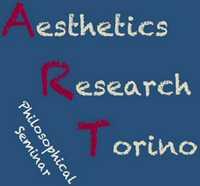Patrick Grüneberg "What makes a successful image? Considering a heterarchy of final purposes" - Torino, 6 settembre 2018

The next lecture of ART (Aesthetics Research Torino) Philosophical Seminar will be delivered by Prof. Patrick Grüneberg on September 6th at 5 p.m. Location: Università di Torino, Aula Guzzo, Via Po 18 - Torino
Patrick Grüneberg
What makes a successful image? Considering a heterarchy of final purposes
The basic problem of this talk is the question about criteria for judging about images. Basically, there are several regards to judge about images. In the following, I am interested to what extent images could be judged as successful from a functional viewpoint. This consideration concerns a particular type of images as proposed by Fichte throughout his late philosophy. Here, images constitute perceptual reality. They do not depict a given reality, but form the medium by which human subjects create reality through action. In this sense, Fichte proposes a constitutive or, as I shall explain, a projective type of image. The problem of judging these images comes up in Fichte's functional exposition of these projective images. He needs some criteria to explain whether an image formed by a subject is a successful image in terms of a successful guidance of action. Fichtes answer consists in his well-known insistence on morality and the moral law. Thus, in order to give meaning to the functional play of images, all image production has to follow the moral law as the final purpose of all human action and being. Through an analysis of Fichtes concept of a projective image, I will try to show that his exclusive determination of the final purpose in terms of the moral law is not mandatory. For this purpose, I will first analyze the functional nexus between perception and action: images as the basis of outer perception originate as the practical design of reality according to the intentions of an agent and the external resistance against these intentions. In this sense, outer perception does not depict a given reality, but forms the product of practical decision-making and real-world action. This functional conception of projective images allows Fichte to explain the unity of perception and action. Second, I will point out the functional need for a criteria to judge these images, and explain the arbitrariness of Fichtes solution. Third, I will introduce the concept of the heterarchy that allows for a complex of final purposes. In functional terms, there are further candidates for judging images, such as aesthetic or ecological criteria. The concept of the heterarchy allows securing the functional validity of images while appreciating the complex and manifold reality of the human lifeworld.
PATRICK GRÜNEBERG (1977) is associate professor at the Institute of Liberal Arts and Sciences, Kanazawa University (Japan). He graduated in philosophy philosophy at University of Groningen (2005) and completed his doctoral thesis about J.G. Fichte's late Doctrine of Scientific Knowledge and Th. Metzingers self-model theory at the Technical University Berlin (2012). Beside working on Fichte's philosophy, he is collaborating with the AI Lab and the Cybernics group at University of Tsukuba. His research concerns theory of subjectivity, volitional action, computational modeling (subjective computing), and value-based models of huma-machine interaction.
ART (Aesthetics Research Torino) is a periodic philosophical seminar organized by the Department of Philosophy and Educational Sciences of the University of Turin and the PhD Program FINO. It is coordinated by Prof. Alessandro Bertinetto.
ART addresses different topics of the contemporary debate in Aesthetics: philosophy of beauty, philosophy of the arts, theory of sensory experience, philosophy of image and imagination, and history of aesthetics.
ART is supported by:
Centro Interuniversitario di Ricerca sulla Morfologia Francesco Moiso (CIM)
Centro di Ricerca Interdipartimentale di Logica, Linguaggio e Cognizione (LLC)
Centro Studi Arti della Modernità
Laboratorio di Ontologia (Labont)




